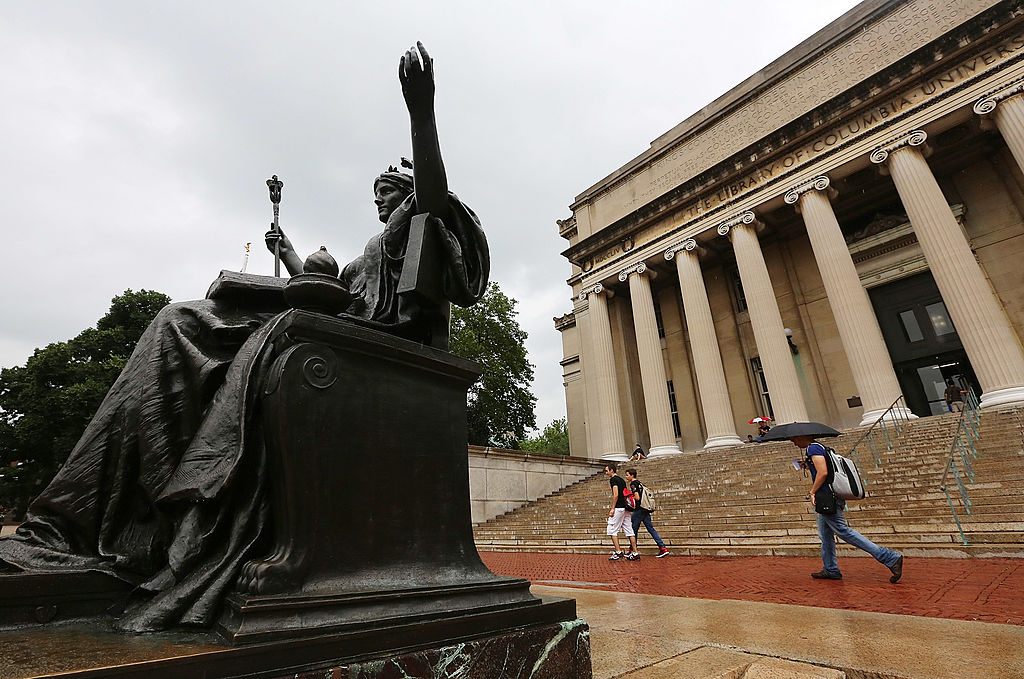‘The Rotation Method’ is one of the most amusing sections of Kierkegaard’s Either/Or. The second-most famous melancholy Dane has some good advice for dealing with irritating absurdity: cultivate arbitrariness when confronted with flagrant examples of it.
There is someone whose conversation you find insufferable. What to do? Kierkegaard’s narrator has some tips: ‘I discovered that he perspired copiously when talking. I saw the pearls of sweat gather on his brow, unite to form a stream, glide down his nose and hang at the extreme point of his nose in a drop-shaped body.’
There is much about cultural life today that can be profitably approached with the Rotation Method. Consider Holland Cotter’s bloviations in the New York Times on Titian: Women, Myth & Power, a small but exquisite exhibition of mythological paintings at the Isabella Stewart Gardner Museum in Boston.
Drawn from stories in Ovid’s Metamorphoses, the six paintings on view depict familiar scenes: ‘The Rape of Europa’, ‘Venus and Adonis’, ‘Diana and Actaeon’, etc. The problem, as Cotter sees it, is that Ovid, and Titian after him, neglected to bring themselves up to date with contemporary feminist concerns. Accordingly, he deprecates Titian’s depiction of ‘repeated images of gender-based power plays and exposed female flesh’. Yes, the old boy could paint. But he clearly was not an enlightened modern. Nor was poor old Ovid.
Cotter’s inadvertently comical review reminded me of another broadside against Ovid, this one in the Columbia Spectator, the chief student newspaper of that once-great university. Written in 2015 by Kai Johnson, Tanika Lynch and Elizabeth Monroe, ‘Our identities matter in Core classrooms’ sounds a very contemporary gong.
Columbia, which even today maintains a vestige of its famous ‘great books’ Core Curriculum program, continues to assign Ovid’s Metamorphoses. As Johnson, Lynch and Monroe report, a student complained to Columbia’s — wait, the sweat is beginning to coalesce — Multicultural Affairs Advisory Board on Literature that reading Ovid made her feel bad.
Really, if you step back and contemplate it, what these skirling young scholars have to say is quite deliciously funny: ‘Ovid’s Metamorphoses is a fixture of Lit Hum, but like so many texts in the Western canon, it contains triggering and offensive material that marginalizes student identities in the classroom.’ There’s more: ‘These texts, wrought with histories and narratives of exclusion and oppression, can be difficult to read and discuss as a survivor, a person of color, or a student from a low-income background.’
Do you suppose parents wonder, just a little, about shelling out tens of thousands of dollars to purchase college educations for their delicately brought-up progeny, only to have them behave like this?
There was a time when I would have posed such questions. Now I am just grateful for the globule of fluid poised precariously on the snout of pretension. The hilarity is nearly endless. Another Columbia student, we read, complains that when she suggested the class read a Toni Morrison novel, a fellow student ‘declared that texts by authors of the African Diaspora are a staple in most high school English classes, and therefore they did not need to reread them’.
The complainant believes that Morrison’s novels are ‘some of the most intellectually and emotionally compelling writing in the last century’ and ‘should be valued as founding texts of the Western canon’, even though the Western canon was founded some millennia earlier. Her fellow student’s objection, the Columbia Spectator says, was ‘revealing of larger ideological divides’. ‘This would have been an opportune moment for the professor to intervene.’
In a sane world, a professor teaching a great books course would have intervened to point out that Toni Morrison is, despite stiff competition, probably the most overrated novelist of the last 30 years. Her works may deserve a place in a sociology course examining how external characteristics can substitute for merit in decaying liberal democracies. But if it is a choice between Dostoyevsky, say, or Austen, Eliot, James, Trollope — any other serious novelist — and Toni Morrison?
The entertainment becomes truly surreal when the students demand to ‘feel safe in the classroom’. Remember, we’re talking about Columbia University in Manhattan, New York in the 21st century, not Afghanistan, Yemen or some other hellhole where the trigger warnings are about real triggers on real guns. But the Columbians demanded that their university should train its faculty to issue ‘trigger warnings’ and support ‘triggered students’. It should also create ‘a mechanism for students to communicate their concerns to professors anonymously, as well as a mediation mechanism for students who have identity-based disagreements with professors’.
The pièce de resistance is a ‘training program’ for professors so they can ‘facilitate conversations that embrace all identities, share best practices, and think critically about how the Core Curriculum is framed for their students’.
In my view, the ‘best practice’ would be to rusticate the vandals, but that is not practically possible. I suppose universities ought to come with a sort of all-purpose disclaimer: ‘Works of art may be offensive. Are you sure you want to see ’em?’ The moral? Enter here, and you might actually learn something. If that prospect offends you, stay away. Achoo.
This article was originally published in The Spectator’s November 2021 World edition.


















